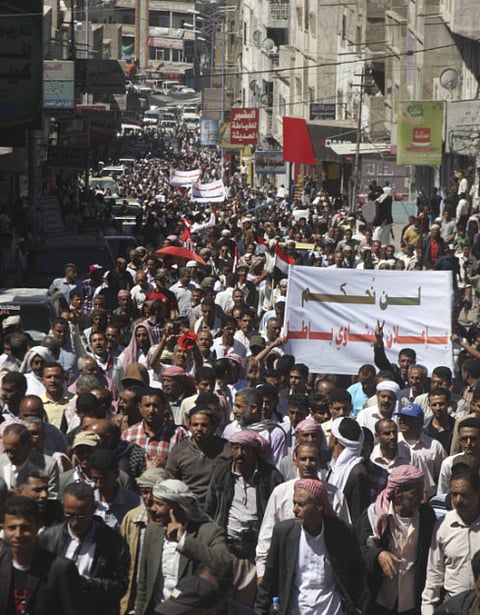UN calls for Yemen President Hadi’s reinstatement
Saleh’s party calls for return to dialogue moderated by the world body

Sana’a: UN Secretary-General Ban Ki-moon called on Sunday for the restoration to power in Yemen of President Abd Rabbo Mansour Hadi after the Al Houthi militia seized power.
“The situation is very, very seriously deteriorating, with the Al Houthis taking power and making this government vacuum,” Ban said, referring to the group which dissolved the Sana’a government and parliament on Friday.
“There must be restoration of legitimacy of President Hadi,” the UN chief told reporters after talks with King Salman in neighbouring Saudi Arabia.
The UN envoy to Yemen returned to Sana’a and resumed contacts with major political players to find a way out of a deepening crisis caused by a rebel takeover, participants in the talks said on Sunday.
Jamal Benomar had left suddenly for Saudi Arabia last week, where he is believed to have held consultations with visiting UN Secretary-General Ban Ki-moon. He returned to Sana’a late on Saturday and held meetings with all the main political factions, including leaders of the ruling Revolutionary Committee set up by the rebels, known as Al Houthis.
Al Houthis are under mounting pressure following their decision on Friday to dissolve parliament, which cemented their takeover less than five months after they seized the capital, Sana’a. Late on Saturday, the party of former president Ali Abdullah Saleh — Al Houthis’ main ally — added its voice to the growing opposition to the takeover and called for a return to the dialogue moderated by Benomar.
The Gulf Cooperation Council has denounced Al Houthis’ “coup.” Egypt, a regional powerhouse with longtime interests in Yemen, says it is alarmed and is closely monitoring the situation there.
The Arab world’s poorest country is reeling from the crisis, with many areas experiencing lengthy power and water cuts. Authorities are finding it increasingly difficult to pay government salaries on time.
Yemen is home to one of Al Qaida’s most active branches. Militants target army and security forces on a near-daily basis across much of the country, and US drone attacks targeting the militants have killed civilians, fuelling popular resentment.
Al Houthis’ capture of the capital in September and its formal takeover over the weekend puts the country of at least 25 million on a slippery path to civil war or sectarian strife. Al Houthis have clashed with Al Qaida militants, who are backed by powerful tribes in northern Yemen.
The Al Houthi takeover has also stoked secessionist sentiments in the south, raising fears of a repeat of the 1994 civil war, when the formerly independent south attempted to break away from its union with the north, forged four years earlier.
Last month, the rebels raided the presidential palace and besieged the residence of President Abd Rabbo Mansour Hadi, a southerner. Within days, Hadi and his Cabinet resigned. They remain under house arrest.
Hadi was elected president in 2012 after a popular revolt forced Saleh to step down.
Like Al Houthis, Saleh is a member of the Zaidi sect, a small branch of Shiite Islam that exists almost solely in Yemen. The Zaidis represent about 30 per cent of Yemen’s population.
Al Houthis’ opponents view them as a proxy of Iran, a charge denied by the rebels.
Sign up for the Daily Briefing
Get the latest news and updates straight to your inbox


